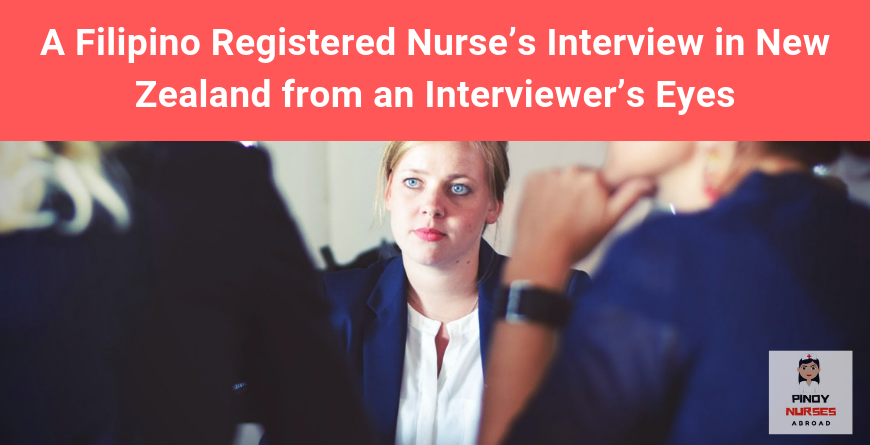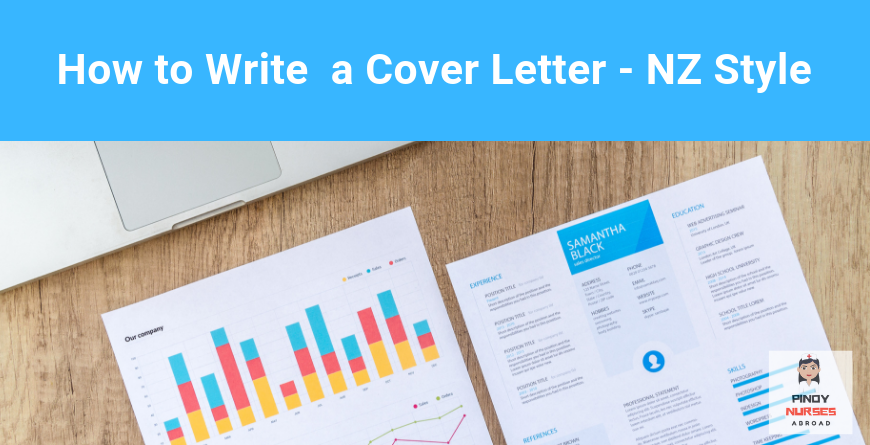A Filipino Registered Nurse’s Interview in New Zealand from an Interviewer’s Eyes

One of my closest friend Jenny Haber wrote this blog a few years ago and I thought of reposting this here to help other Filipino nurses looking for a job in NZ. Jenny is such a go-getter – she’s very passionate about what she does and she usually gets the job she wants. She became a Clinical Manager at her 20’s and she interviewed nurse applicants so here are her tips.
Two weeks ago, I went for an interview for a role that I really wanted. Initially, I thought I was going to feel exactly the same way I felt when I had my first RN interview in NZ – but I didn’t. Instead, I confidently went in the interview room and just started answering the questions and chatted away feeling relaxed and comfortable the whole time. The next day, I got a phone call and they told me that I got the job. They also told me that there were 5 people who went for the interview and they shortlisted three. One of the candidates who was shortlisted had 28 years experience, the other had 20 and I had 7. I obviously had the least no of years of experience. But why did I get the job?
This is what I’m going to share to you today.
The way you look does matter. In this age and time, some people think that how you dress up during interviews doesn’t matter. Well, it actually does. And to be honest, how you look the moment you step in the interview room is your first selling point to a potential employer.
Female interview outfit.
– Dress with close shoes
– Slacks with a collared top and close shoes
Male interview outfit
– Slacks with a collared top
Some come to their interviews wearing their RN uniform which is also acceptable as most interviews are scheduled before or after a shift.
A few things that I want to point out are – first, it’s always a plus when you smell good but please also remember that most interviews happen in a close room, so don’t put too much perfume to the point of suffocating your interviewer. Secondly, if you’ve got long hair, please tie it or put it in a way where interviewers can see your face. Also, if you have facial rings, some managers actually appreciate it if you take this off. I worked with a couple of managers who mentioned that they really appreciate it when they see someone take their facial rings off prior to an interview as they feel that they went the extra mile to look neat and well presented.
Handshakes are gold. In NZ, we greet each other with a handshake. In the Philippines, handshakes are not given much importance. A lot of times in the past, some Filipinos seem to be too scared to extend their hand and shake my hand or they do extend their hand but give me a very limpy shake , almost like there’s no conviction to that shake. Here in NZ, a potential employer judges you and can tell a lot about your character base on how you shake their hand. Extroverts have firm confident grips while shy people and neurotics tend to shake hands softly and gently. So, when you come in for your interview and a potential employer extends their hand to shake yours, extend your hand and give their hand a firm grip – this will tell them that you mean business and you’re here to get that job.
Body language. The moment you walk in the interview room, potential employers look at your clothes, how you walk,how you present yourself. They look at everything. One thing that really matters to them is how often you smile. I’ve interviewed a lot of carers and Registered Nurses who not once smiled during the interview. And what did that tell me? Pretty much that they are most likely going to be the same once they start working on the floor. So, be generous with your smiles. It will not only impress your interviewers but also helps in getting rid of your anxiety and nervousness. Also, your posture can make a difference. When you are sitting on the chair, make sure you keep yourself upright but not too stiff, this tells us that you are feeling confident and you have high self-esteem. Studies have also shown that having good upright posture with your shoulders out and chin up gives you confidence. If you’re hunched down or sitting at the edge of the chair, it gives interviewers the impression that you are nervous and uncomfortable. Also, it is always good to lean slightly towards the interviewer. This tells them that you are interested in and involved in the conversation.
Eye Contact. This is something that we Filipinos are not so good at because of our culture. However, it is vital that we maintain eye contact with our interviewers throughout our interview. This tells them that you are actively listening. However, this needs to be done with art. Some people appear to look at you so intensely and aggressively, blinking at regular intervals and nodding every now and then that sometimes we wonder if they are actually getting what we are saying or if they are just staring. One thing that I’ve learned is when I talk to an interviewer, I maintain eye contact for a few seconds, look away briefly and re-establish eye contact and this makes me feel more comfortable compared to just constantly staring at them for the whole duration of me answering their question.
Communication. One of the things that are really important for potential employers is your ability to communicate. In this profession, we deal with people which means we need to constantly communicate with them. Employers will always favour those who can speak English fluently. In the past, I’ve interviewed some Filipinos who spoke fluently but didn’t monitor their voice delivery very well. Now, what’s the use of you being good at English when interviewers can’t hear a word that you are saying? You need to speak in a clear and controlled voice which conveys confidence. And please don’t speak in monotone, put some life and colour into your answers but also remember not to overdo it. Remember to pause, to breathe and to take your time in answering the questions – no one is rushing
you.
Questions and Answers. One thing that can make us feel confident and shine during interviews is the amount of knowledge we have. It always feels good when you know within yourself that you’ve come prepared no matter what question is asked. In NZ, interviewers make you feel comfortable first by telling you about them and what they do. One question they often ask is if you know much about them and its always good to be able to say a few things about them which mean that you have done your research and that you are interested to work for the company. Then they start asking you questions like tell us about yourself, where you use to work and what you used to do, why you left previous employment, behavioral questions, clinical, health and safety, restraints, risk management and a whole lot more. There are too many possible questions to mention that instead of me writing them all WE WILL HOLD A FREE WEBINAR to tell you more about these questions and discuss some really good answers. I will post more information about the date and time on my Facebook Page soon.
Ask them. At the end of each interview, employers will always ask you if you have any questions for them. This is now a good opportunity to ask them about staffing levels, roster, pay etc. A lot of us don’t want to ask questions thinking that employers might think that we are overconfident or asking too much but really, we appreciate people who do because it tells us that they are thinking and that they are on to it.
Pay. Lastly, please be kind to yourself and tell them exactly how much you want. A few nurses we interviewed in the past gave us answers like, it’s up to you or minimum wage and what do they get? They get minimum wage. While some ask for $2 higher than the minimum and what do they get? They either get exactly what they asked for or a $1.50 higher than the minimum wage.
Tour. After every interview I had, I always asked for a tour. As I am given a tour, I observe how the staff interact with the residents and each other. Are the staff nice and welcoming? Are the staff smiling and do they look content and happy in their jobs? Are there residents neat and tidy? Are the rooms clean? Does the facility smell nice? It’s always good to get a feel of a potential workplace. Remember, this is where you will be spending 8 hours of your day 5 days a week, so you need to make sure that you will be happy and content in this place.
To sum it all up, you should interact with the interviewer as an equal, not a subordinate. When you come into your interviews, enter the room with confidence and with a smile. Walk straight, sit upright to gain more self-esteem. Show interviewers who you really are. Don’t get anxious or nervous because this really comes through and then you fail to show them how amazing of a person you are. And lastly, when answering questions, don’t answer them like you’ve rehearsed the answers again and again but answer them with passion, with conviction to the point of inspiring your interviewer.


Responses